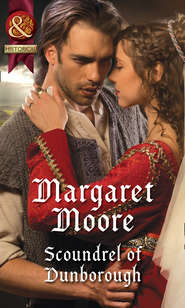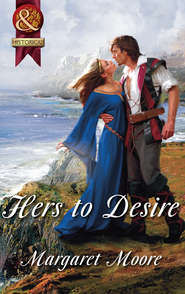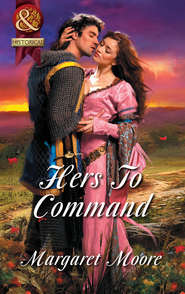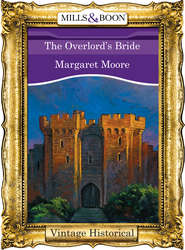По всем вопросам обращайтесь на: info@litportal.ru
(©) 2003-2024.
✖
A Warrior's Bride
Настройки чтения
Размер шрифта
Высота строк
Поля
Rufus threw himself down on the first straw pallet he spied and gave her a quizzical look. “Isn’t he the one been neglecting his duties all these years?”
“Yes!”
“Then why would your father want you to marry a reckless puppy like that?”
“Because our lands join.”
“Well,” Rufus said, making a pillow of his hands and lying back so that he was looking at the beams in the ceiling, “you would be the lady of a great estate. You could do much worse.”
For a moment, Aileas was very tempted to kick him. Didn’t he realize she thought he was the perfect man, the perfect warrior? He would be the perfect husband, too.
How blind could a grown man be?
“I saw him. On the road,” she revealed scornfully as she sat cross-legged on a nearby pallet. “I’m sure he’s as vain as ever. You should see his tunic. It’s embroidered He probably cries if he spills anything on it.”
Rufus chuckled companionably. “I can hardly wait to meet him.”
Aileas could hardly wait for Rufus to meet him, too.
Then he would see that she could never marry a man like Sir George de Gramercie.
Chapter Two
As far as George could tell, nothing at all had changed at Dugall Castle in the years he had been away. The grimly gray stone walls were still thick and imposing, and the soldiers guarding the gates still numerous and watchful, as if a horde of enemies might suddenly sneak out of the moat and attack.
Inside, there was not an animal, bale of hay, barrel or stick out of place. Several men were engaged in swordplay or practising their technique with mace and chain. Even the servants seemed to bustle about in a curiously military manner, and not a one of them was female.
Far from making George feel secure and safe, it was as if the castle were under seige, with all the women safely sent away. Indeed, everything about Dugall Castle seemed to give the place a curious sense of tension and impending doom that George did not like.
The surrounding village also had this air of suppressed anticipation, which was quite unnecessary, given the general peace in the land and the amiability of Sir Thomas’s neighbors.
As George dismounted and handed his reins to a page who trotted out to meet them, he suddenly realized that he could feel insulted, or even threatened, by this castle’s battle-ready state, until he considered the squalor of some noblemen’s castles. Here, everything was neat and exactly where it should be, which was not usually George’s experience of households where men were on their own, without women to organize their domestic comforts.
Sir Thomas himself marched out of the great hall almost at once. Though his neighbor’s face was marked by several scars of battle and tournament, his bearing was still erect, and his gaze still as piercing as a hawk’s. As usual, he wore a surcoat exactly like the one he had donned years ago when he went on Crusade.
In fact, as George noted the several clumsily mended rents and the distinctly gray tinge to the white fabric that comprised the majority of the overgarment, he realized that perhaps this was the very one. Under that was a coat of very fine chain mail, polished to gleaming perfection. Sir Thomas wore no gloves, despite the cold, exposing gnarled, chapped hands, which George didn’t doubt could still level a man with one blow or maintain a grip on any weapon for hours.
He had always made George feel like a naughty little boy. Fifteen years, it seemed, were not enough to erase that sensation.
Sir Thomas halted and briskly took his guest by the shoulders to give him the kiss of greeting, his mail jingling slightly. “Welcome, Sir George,” he said, eyeing George’s soldiers over the younger man’s shoulder even as he spoke. “It is good to see you again.”
“And you, too, Sir Thomas,” George replied, wondering if his men found favor with Sir Thomas, for the old man had a keen eye for a fine soldier. He subdued the urge to ask. After all, he was an overlord in his own right now.
“Come inside and have some wine. It’s late in the day. You must have gone slowly, or else come by the north road,” Sir Thomas noted, his voice slightly condemning, with the unspoken implication that unless George had taken the longer route, the lateness of his arrival meant that he was a lazy fellow.
George reminded himself that Sir Thomas thought everyone who didn’t work as hard as he did or take his military and lordly duties as seriously must be a lazy fellow, a judgment that encompassed every other nobleman George knew.
Then he realized that Aileas must not have returned, or if she had, she had not mentioned their meeting on the southern road. Considering her own impertinent behavior, perhaps she had thought that the better course.
They entered the hall, a large, exceptionally cold room in which the vast hearth stood empty. The walls were free of tapestry or anything that could remotely be construed as decoration, and the furnishings old, worn and unembellished. There was not a single feminine attribute about the place, nor were there any soldiers or noble guests taking their ease inside.
Sir Thomas sat in the largest chair on the dais, a heavy oaken thing much carved, with no cushion upon the seat. He gestured for George to sit next to him in a chair of similar design. George complied, to his regret, for the seat was as hard, cold and comfortable as a boulder, and the carving in the back of the chair made it feel as if fifty dagger points were digging into his back.
“How is Lady Aileas?” George inquired politely, deciding that if she had not thought fit to mention their meeting, neither would he. “I had hoped to greet her when I arrived.”
Sir Thomas made a dismissive grunt. “She’s healthy as that horse of hers. Took him out for a gallop. They’ll be back soon.”
Although George knew Sir Thomas was not a man given to emotional display—or. indeed, display of any kind—the perfunctory tone of his reply startled him nonetheless, especially when George recalled that Aileas had apparently been riding alone. “She is a skilled horsewoman, I’m sure,” he ventured.
“Best I ever saw. Taught her myself,” Sir Thomas bragged. “Better even than her brothers, and they’re excellent.”
Not excellent enough to keep from getting thrown and abandoned, George thought. “I daresay she likes a lively horse.”
A cowed-looking page boy appeared in a doorway George suspected led to the kitchen. “Wine!” Sir Thomas barked, and the lad quickly disappeared. “Lively, did you say?” his host continued. “That stallion of hers is the very devil of a horse. I told her she’ll break her neck, but she won’t listen to me. Too strong willed.” For all the apparent condemnation of his words, his tone was distinctly boastful.
“She has an escort, I presume?” George asked, certain the answer would be no and beginning to wonder if Aileas had met with another accident on the journey home.
“Escort?” Sir Thomas replied with a harsh caw of a laugh. “She’d lose ’em in a thunderclap if she did. Prefers to ride alone. Always has. As long as she stays on my land, she’s safe.”
“Of course,” George said, not willing to point out that outlaws and brigands often didn’t respect a lord’s borders, and the sight of a young woman alone would be tempting for such men.
Sir Thomas continued to peer angrily at the kitchen doorway. “Where the devil’s the wine?” he bellowed, then he turned his fierce gaze on George. “She’s like her mother, that one. See this scar?” Sir Thomas pointed at a small, crescent-shaped mark on his forehead. “Her mother gave me this the first time I tried to kiss her.” His bushy gray eyebrows lowered ominously while the rest of his face remained immobile. “Aileas would do worse to any man who took liberties.”
“Naturally,” George replied nonchalantly.
Sir Thomas leaned back in his chair. Undoubtedly chain mail made that possible. The page boy arrived with a carafe of wine and two plain silver goblets into which he poured the burgundy beverage, his hands trembling all the while. Sir Thomas said nothing, but George smiled with kindness when the boy glanced at him.
The boy finished his task without any response, then quickly moved to the side of the room, where he proceeded to stare at the men as they drank. George suspected that the lad had absolutely no interest in anything passing before him except the necessity of refilling the goblets when necessary.
“Pity about your father,” Sir Thomas remarked after taking a gulp of wine.
George took a sip of the surprisingly fine wine and steeled himself to discuss that particular subject. “Yes. He was a good man.”
“A good neighbor. Little lax, perhaps, but good for all that.”
George forced a smile onto his face.
“Sir Richard Jolliet still the estate steward?”
“Yes, and his brother, Herbert, is the household steward. Richard has just gone to London to answer some questions about the taxes on my property.”
“Not trouble with the exchequer, I trust?” the old man asked suspiciously.
“Not a bit. I may have to pay a little more this year, that’s all. My estate has been doing rather better than expected.”
“Ah! Glad to hear it. It was a hard winter, but those of us who were prepared weathered it easily enough.”
George nodded his agreement, although he doubted anybody would ever be as prepared as Sir Thomas for bad times. His father always said that Sir Thomas lived in anticipation of a repetition of the biblical seven years of famine.











